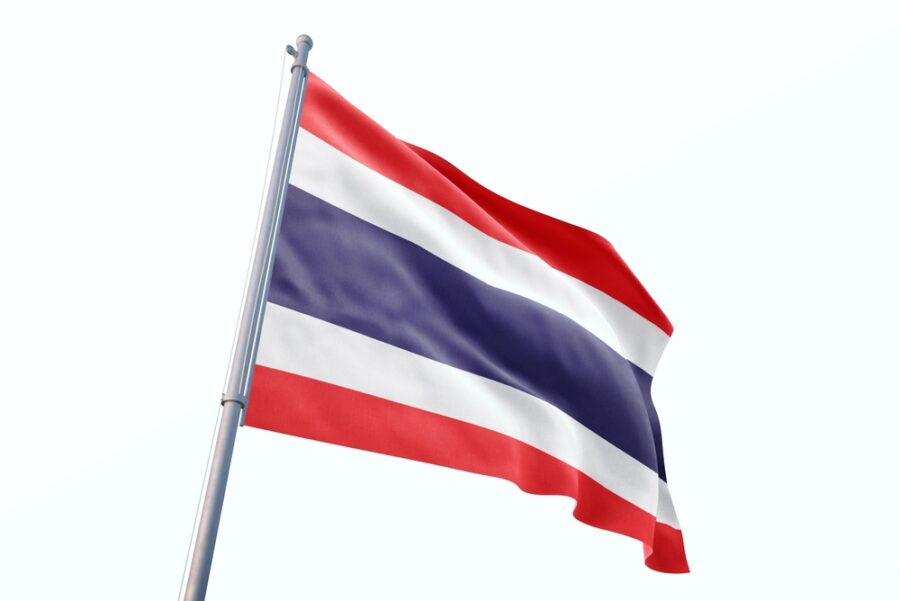Thai police dismantle illegal online casino in Chiang Rai

Thailand’s cyber police have shut down an illegal online gambling operation in Chiang Rai’s Mae Chan district, arresting a 24-year-old woman believed to be an administrator for the website.
On Sunday, officers from the Cyber Crime Investigation Bureau and the Royal Thai Police Operations Centre executed a court-approved search warrant, detaining Ms. Kamonphat and seizing a laptop and mobile phone allegedly used in the operation.
The arrest follows an investigation into a website called boost4fatcash, which has been identified as a front for illegal gambling. The platform reportedly facilitated automated deposits via domestic bank accounts, while withdrawals were processed directly through the site.
Police say that Kamonphat admitted to working for the site for over a year, following a two-year spell with a similar operation in Myanmar. She reportedly earned a monthly salary of THB15,000 (US$462)1 THB = 0.0308 USD
2025-10-07Powered by CMG CurrenShift, and police estimate that the site’s 9,000 users generated THB5 million (US$153,895)1 THB = 0.0308 USD
2025-10-07Powered by CMG CurrenShift per month.
She faces charges under Thailand’s Gambling Act for organizing and promoting online gambling without state authorization, and the case has been transferred to Mae Chan Police Station for further legal proceedings.
The raid is part of a campaign targeting illegal gambling networks that have links to cybercrime and money laundering. In May, Thai authorities arrested a Buddhist monk after he used THB300 million (US$9.2 million)1 THB = 0.0308 USD
2025-10-07Powered by CMG CurrenShift in temple donations to gamble online.
Charlotte Capewell brings her passion for storytelling and expertise in writing, researching, and the gambling industry to every article she writes. Her specialties include the US gambling industry, regulator legislation, igaming, and more.
Verticals:
Sectors:
Topics:
Dig Deeper
The Backstory
Crackdowns across Asia set the stage
The current case follows a year of stepped-up enforcement against online casinos across East and Southeast Asia, as police and regulators target illicit sites, payment rails and the affiliate marketers that funnel traffic to offshore platforms. Thailand, South Korea, Japan and Vietnam have each pursued multi-agency raids and legal changes aimed at severing the incentives that have fueled a surge in illegal wagering. Recent actions show authorities coordinating across borders and moving beyond player arrests to pursue operators, promoters and the infrastructure that keeps cash flowing.
Thai officers intensified operations in the north, where a cyber police raid in Chiang Rai’s Mae Chan district dismantled an online casino front that processed automated deposits through domestic banks and direct site withdrawals. Investigators said the site drew about 9,000 users and THB5 million a month, illustrating how small teams can generate large volumes when paired with local payment access. The case, transferred to Mae Chan Police Station, is part of a broader Thai campaign linking illegal gambling to cybercrime and money laundering.
In South Korea, police are pursuing larger, long-running networks. South Chungcheong investigators shut down an eight-site ring based in the Philippines, Vietnam and Cambodia, arresting 32 people and alleging at least KRW27.1 billion in profits over five years. Authorities estimate more than KRW530 billion in wagers flowed through the sites, which used live sports streaming to drive real-time betting and corporate-style tactics to project legitimacy. The probe started in 2023 after reports that teenagers were recruited to blast promotional messages, highlighting the social harms that often prompt tougher policing.
Japanese authorities have moved in parallel, but with a sharper focus on marketing gateways and storefront intermediaries. Tokyo police arrested 12 people tied to an operation that let customers play baccarat for cash using overseas sites, seizing at least 20 computers and data suggesting more than 5,000 customers. The shop-level busts have coincided with national policy moves to curb the digital supply chain.
Japan pivots from takedowns to legal deterrence
Japan’s National Police Agency signaled a policy turn from ad hoc takedowns to preemptive enforcement tied to addiction measures. Ahead of a revised law taking effect Sept. 25, the NPA began requesting removal of icasino sites and ads aimed at Japanese users, warning that even “free play” portals or link hubs could be targeted. Officials said they may update the Internet Hotline Center’s guidelines to explicitly cover illegal igaming, aiming to shrink the online footprint before sites capture new customers.
Police also tested a novel approach by charging marketers, not just operators. In a first-of-its-kind action, Gifu Prefectural Police charged two men tied to an affiliate site that allegedly funneled JPY70 billion in wagers to a Curacao-based casino. Investigators said the site touted “winning strategies,” ran weekly promotions and operated a 300-member Discord for exclusive tips, but the key legal pivot was the compensation model: commissions linked to total wagers rather than player losses. That structure, police indicated, made the affiliate a direct participant in the gambling enterprise, opening a new path to liability even when the casino is licensed abroad.
The enforcement arc—removal requests, shop raids and affiliate prosecutions—suggests Japan is building layered deterrence. The message is that jurisdiction hinges on the audience and solicitation, not the server location. That stance echoes warnings in Japanese media coverage that crackdowns will reach any business soliciting local users, regardless of offshore licensing.
Cross-border rings expose operational backbone
Vietnamese authorities, working with Lao counterparts, have mapped how cross-border rings scale. A joint operation charged 31 people linked to an estimated VND1.3 trillion in illegal bets. Lao police raided multiple sites in Vientiane, seizing 35 phones, 37 computers and live-streaming gear used to advertise games, then transferred 29 suspects to Vietnam for further investigation. Police identified leaders in Hanoi and Ho Chi Minh City and described structured roles for monitoring bettors’ weekly profit and loss, paying overseas providers, handling salaries and splitting proceeds.
The Vietnam-Laos case clarifies how regional rings blend social media promotion, livestream commerce tools and local cash channels to reach bettors while obscuring command and control. It also shows why enforcement has migrated upstream from end users to logistics and management. Where Japanese cases target affiliates and storefronts, and Thai cases target site administrators tied to domestic banks, the Vietnam probe targets the middle office functions that keep wagers flowing and staff paid.
South Korean investigators have documented similar back-end tactics at scale. The eight-site network relied on Telegram, burner phones and female dealers to attract traffic and avoid detection, and modeled itself after corporate operations with promotional funnels that clicked through to real-time games. That mix of marketing polish and encrypted communications is becoming standard across cases, complicating traditional policing and pushing agencies to seek cross-border data and financial cooperation.
Payments and promotion become enforcement choke points
A consistent thread is control over payments and advertising. In Thailand’s case, alleged administrators leveraged local bank accounts for automated deposits, converting gray-market payment rails into a growth engine. In Japan, the NPA’s takedown requests aim to shrink the ad supply and shut the door on “free” game portals that funnel users to offshore casinos. The affiliate prosecution goes further by treating marketing compensation as participation in the gambling enterprise.
External probes add scale and urgency. In South Korea, police and local media reported broader actions, including a network tied to hundreds of millions of dollars in transactions. Japanese coverage has tracked the legal changes and prosecutions, including reporting on police warnings to advertisers and site operators as the revised law took effect, and NHK accounts of Tokyo raids that highlight how storefronts channel players to overseas platforms. Together, the cases show authorities converging on two levers—payments and promotion—to cut off user acquisition and cash-out paths.
These choke points matter because they are replicable and enforceable without full extraterritorial reach. Banks, ad networks and hosting providers sit inside domestic jurisdictions. Cutting their ties to gambling sites raises operating costs and customer friction, which can rapidly shrink monthly handle even when core servers remain offshore.
Why the stakes are rising
Governments frame the crackdown as a public safety and consumer protection issue with fiscal overtones. Police in multiple countries cite links to fraud, money laundering and youth targeting, as seen in South Korea’s warning after teenagers were recruited to promote sites and Thailand’s emphasis on cybercrime ties. Japanese officials have coupled enforcement with addiction policy, aiming to curb a sharp rise in illegal offerings that function outside tax and responsible gaming regimes. Vietnam’s coordinated arrests underscore how cross-border hubs can scale quickly when left unchecked, complicating tax collection and capital controls.
The trajectory points to more integrated enforcement: upstream pressure on advertisers and affiliates, midstream disruption of payment rails and storefront facilitators, and downstream prosecutions of operators who localize content and outreach. For platforms, the risk calculus has shifted. Soliciting users in tightly regulated markets can now trigger action against not only the sites, but also the marketers and payment partners that make the business viable.
As the latest case unfolds, the recent run of raids and legal measures across Thailand, South Korea, Japan and Vietnam provides the backdrop. Authorities are testing new theories of liability and sharing tactics. The common objective is to make illegal online casinos harder to find, fund and cash out. That is the context in which this week’s enforcement move lands—and the reason operators and their affiliates are reassessing where and how they try to grow.






